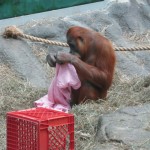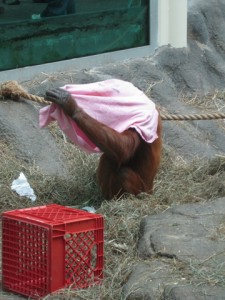Many conservatives have a "hate-love relation with biology.” Primatologist Frans De Waal terms this "the first great paradox of the American political landscape” in his new book, The Age of Empathy: Nature's Lessons for a Kinder Society. In this new book, De Waal has produced another tome of lively writing and thoughtful analysis, reminding us of our exquisite human animal roots. He is out to set the record straight on a gnawing social issue: too many people invoke "evolution" to justify treating each other in contemptuous ways. This has got to stop, because this modern version of "Social Darwinism" paints a highly selective and distorted view of the kind of animals we humans are based on a wildly inaccurate distortion of how natural selection works.
Although I am not even halfway into De Waal’s book, I can see that De Waal has launched a sustained broadside against the commonly expressed perspective that evolutionary theory equates to "social Darwinism," an approach embraced by many conservatives. The idea of social Darwinism is that "those who make it [successfully in life] shouldn't let themselves be dragged down by those who don't." The idea was championed by British political philosopher Herbert Spencer in the 19th century. Spencer "decried attempts to equalize society’s playing field," and said of the poor that "the whole effort of nature is to get rid of such, to clear the world of them, and make room for better." De Waal comments that the business world fully embraces this idea and characterizes competition as a "law of biology" that will improve the human race. We thus have "the second great paradox of the American political landscape":
Whereas the book found in most American homes and every hotel room urges us on almost every page to show compassion, social Darwinists scoff at such feelings, which only keeps nature from running its course. Poverty is dismissed as proof of laziness, and social justice as a weakness. Why not simply let the poor perish?
Many of these conservatives embrace the metaphor of the invisible hand, arguing that this invisible hand "will take care of society's woes." De Waal notes, however, "the invisible hand . . . did nothing to prevent the appalling survival-of-the-greatest scenes in New Orleans" following Hurricane Katrina in 2005.
Why are the assumptions about biology always on the negative side? [p. 4] . . . What we need is a complete overhaul of assumptions about human nature. Too many economists and politicians model human society on the perpetual struggle they believe exists in nature, but which is a mere projection. [p. 7] . . . Our bodies and minds are made for social life, and we become hopelessly depressed in its absence [p. 10] . . . [It is a great myth] that human society is a voluntary creation of autonomous men. [p.20] . . . When our ancestors left the forest and entered an open, dangerous environment, they became prey and evolved a herd instinct that beats that of many animals. We excel at bodily synchrony and actually derive pleasure from it. [p. 20]. . . . All primates have this tendency [to develop trusting alliances], and some even invest in the community as a whole. Instead of just focusing on their own position, they demonstrate group-oriented behavior. [p. 34]
De Waal’s main message is that we are NOT condemned by nature to treat each other badly. Though competition is part of the picture, we have evolved to be predominantly groupish and peace-loving beings who are well-tuned to look out for each other. Not that we always look out for each other admirably, but there is plenty of reason to conclude that human animals are highly social in an empathetic way. Keep this book handy for the next time someone claims that they don't need to care about people who are struggling to make it because nature is “dog eat dog.” That approach to life is a cop-out; it is certainly not justified by Darwin's work.



